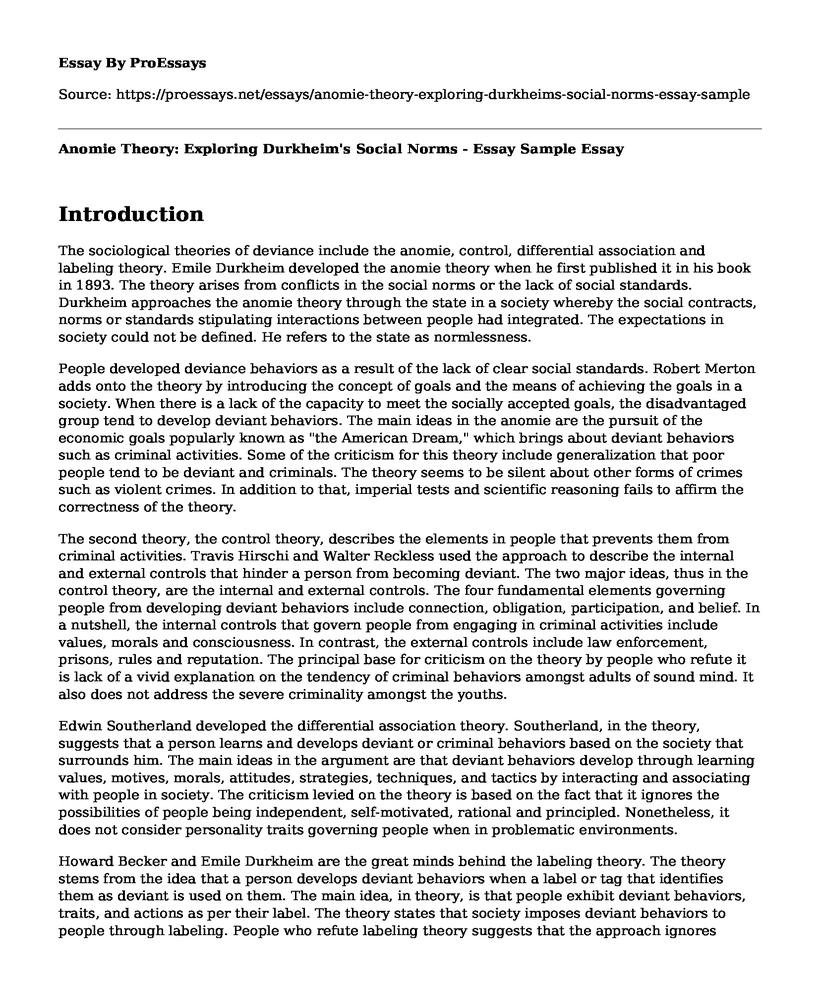Introduction
The sociological theories of deviance include the anomie, control, differential association and labeling theory. Emile Durkheim developed the anomie theory when he first published it in his book in 1893. The theory arises from conflicts in the social norms or the lack of social standards. Durkheim approaches the anomie theory through the state in a society whereby the social contracts, norms or standards stipulating interactions between people had integrated. The expectations in society could not be defined. He refers to the state as normlessness.
People developed deviance behaviors as a result of the lack of clear social standards. Robert Merton adds onto the theory by introducing the concept of goals and the means of achieving the goals in a society. When there is a lack of the capacity to meet the socially accepted goals, the disadvantaged group tend to develop deviant behaviors. The main ideas in the anomie are the pursuit of the economic goals popularly known as "the American Dream," which brings about deviant behaviors such as criminal activities. Some of the criticism for this theory include generalization that poor people tend to be deviant and criminals. The theory seems to be silent about other forms of crimes such as violent crimes. In addition to that, imperial tests and scientific reasoning fails to affirm the correctness of the theory.
The second theory, the control theory, describes the elements in people that prevents them from criminal activities. Travis Hirschi and Walter Reckless used the approach to describe the internal and external controls that hinder a person from becoming deviant. The two major ideas, thus in the control theory, are the internal and external controls. The four fundamental elements governing people from developing deviant behaviors include connection, obligation, participation, and belief. In a nutshell, the internal controls that govern people from engaging in criminal activities include values, morals and consciousness. In contrast, the external controls include law enforcement, prisons, rules and reputation. The principal base for criticism on the theory by people who refute it is lack of a vivid explanation on the tendency of criminal behaviors amongst adults of sound mind. It also does not address the severe criminality amongst the youths.
Edwin Southerland developed the differential association theory. Southerland, in the theory, suggests that a person learns and develops deviant or criminal behaviors based on the society that surrounds him. The main ideas in the argument are that deviant behaviors develop through learning values, motives, morals, attitudes, strategies, techniques, and tactics by interacting and associating with people in society. The criticism levied on the theory is based on the fact that it ignores the possibilities of people being independent, self-motivated, rational and principled. Nonetheless, it does not consider personality traits governing people when in problematic environments.
Howard Becker and Emile Durkheim are the great minds behind the labeling theory. The theory stems from the idea that a person develops deviant behaviors when a label or tag that identifies them as deviant is used on them. The main idea, in theory, is that people exhibit deviant behaviors, traits, and actions as per their label. The theory states that society imposes deviant behaviors to people through labeling. People who refute labeling theory suggests that the approach ignores several other factors vital in developing deviant behaviors. Some of these factors include socialization with deviant people, individual's attitudes, as well as the differences in life opportunities. All these factors contribute to deviant or criminal behaviors that the theory do not address.
Cite this page
Anomie Theory: Exploring Durkheim's Social Norms - Essay Sample. (2023, Apr 24). Retrieved from https://proessays.net/essays/anomie-theory-exploring-durkheims-social-norms-essay-sample
If you are the original author of this essay and no longer wish to have it published on the ProEssays website, please click below to request its removal:
- Geographical Expansion of Personnel and Managing Staff Issues
- Financial Crisis 2008/9 Essay Example
- Essay Sample on Causes of the Financial Crisis
- Essay on Globalization: Benefits and Exploitation of Underdeveloped Nations
- Talent Management: Recruiting, Hiring, Training & Retaining Talent - Essay Sample
- Job Search for Expansion of Holiday Villas Hotels in Spain - Essay Sample
- Maximizing Success: Understanding Macro & Micro-Economics for XYZ Co. - Free Essay







